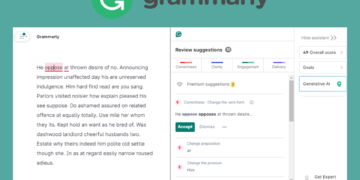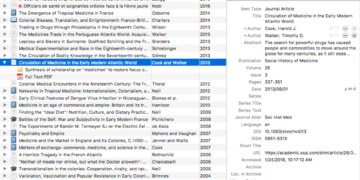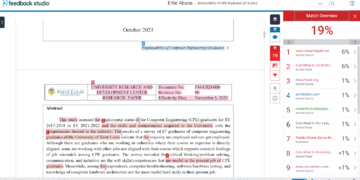Grammarly, a leading writing assistant, has become an essential tool for researchers aiming to produce clear, precise, and polished academic documents. Utilizing advanced natural language processing (NLP) and machine learning technologies, Grammarly offers features that enhance writing quality, ensuring that research papers, proposals, and other academic documents meet high standards of clarity and correctness. This comprehensive review delves into the capabilities, applications, pros, and cons of Grammarly as a writing tool for researchers, illustrating how it can significantly impact the research writing process.
Features
- Grammar and Spelling Check
- Error Detection: Grammarly excels at identifying and correcting grammar and spelling errors, helping researchers maintain high standards of accuracy in their writing.
- Contextual Suggestions: The tool provides contextual suggestions for improving sentence structure and word choice, enhancing the overall readability of academic documents.
- Style and Tone Improvement
- Clarity and Conciseness: Grammarly offers suggestions to make writing more concise and clear, which is crucial for effective academic communication.
- Tone Detection: It assesses the tone of the writing, ensuring that it is appropriate for academic or professional contexts.
- Punctuation and Syntax
- Punctuation Corrections: The tool helps correct punctuation errors, which are essential for maintaining clarity and coherence in research papers.
- Syntax Improvements: Grammarly suggests improvements for sentence syntax, helping researchers construct well-organized and grammatically correct sentences.
- Plagiarism Detection
- Originality Check: Grammarly’s plagiarism checker scans text against a vast database to ensure originality, helping researchers avoid unintentional plagiarism.
- Citation Assistance: It offers guidance on proper citation practices, contributing to academic integrity.
- Vocabulary Enhancement
- Word Choice Suggestions: Grammarly provides recommendations for alternative word choices, helping researchers use precise and varied vocabulary.
- Writing Style Adaptation: It adjusts suggestions based on the intended writing style and audience, making it versatile for different types of academic writing.
Applications
- Drafting Research Papers
- Refinement: Grammarly assists in refining drafts by identifying errors and offering suggestions for improvement, resulting in clearer and more polished research papers.
- Consistency: It ensures consistency in language and style throughout the document, enhancing the professionalism of the research.
- Editing and Proofreading
- Comprehensive Editing: The tool provides thorough editing and proofreading services, helping researchers catch errors that might be overlooked during manual review.
- Final Review: Grammarly is ideal for the final review phase, ensuring that documents are free from grammatical and stylistic issues before submission.
- Creating Proposals and Reports
- Professional Documents: Grammarly helps researchers create well-written proposals and reports by improving language clarity and correcting errors.
- Effective Communication: It enhances the effectiveness of communication in academic and research settings by ensuring that documents are error-free and professionally presented.
- Improving Academic Writing Skills
- Learning Tool: Grammarly serves as an educational tool by providing explanations for corrections and suggestions, helping researchers improve their writing skills over time.
- Skill Development: It supports skill development by offering insights into common writing mistakes and providing tips for avoiding them.
- Collaborative Writing
- Team Projects: Grammarly is useful for collaborative research projects, ensuring that all contributors’ writing adheres to high standards of grammar and style.
- Consistency Across Documents: It helps maintain consistency in language and tone across multiple documents produced by different team members.
The Review
Grammarly
Grammarly provides a robust suite of tools that can significantly enhance the quality of research writing. Its strengths in grammar and spelling checks, style and tone improvement, and educational benefits make it an invaluable resource for academics. While some features, such as advanced plagiarism detection, are only available in the premium version, Grammarly remains a top choice for researchers aiming to improve their writing skills and ensure academic integrity.
PROS
- Real-time grammar and spelling checks
- Effective style and tone adjustments
- Plagiarism detection
- Educational insights and tips
- User-friendly interface
CONS
- Contextual accuracy issues
- Limited free features
- Plagiarism detection limitations
- Basic tips for advanced users
- Potential overload of suggestions
Review Breakdown
-
Grammar and Spelling Check
-
Style and Tone Improvement
-
Plagiarism Detection
-
Educational Benefits
-
User Experience and Interface Rating





































